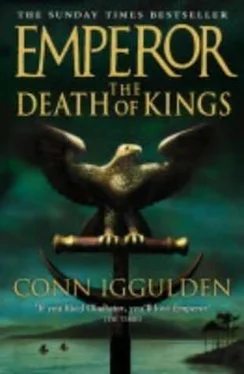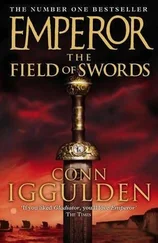It looked as if they had an old trick in mind. One after the other, they would speak to the Senate at great length until the session finished, or at the least until enough of their followers could be summoned to vote it down. If the proposal was pushed to the following session, it might not pass at all.
Crassus looked over to Cinna and caught his eye in commiseration. To his surprise, the older man flickered a wink in his direction. Crassus relaxed and settled back in his seat. Money was a powerful lever; he knew that as well as anyone. To hold up the vote, the Sullans had to be allowed to begin, and the Master of Debate recited the details of the proposal without once looking up at the benches where they stood, clearing throats noisily for his attention.
When the details had all been described, the Master of Debate called immediately for a vote. One of the Sullans swore loudly and walked out of the Senate hall, a gross breach of etiquette. The appointment passed easily and the session was declared closed. During the final prayer, Crassus sneaked a glance at Pompey and Cinna. He would have to choose his gift to Servilia with care. No doubt those two had similar ideas.
Julius waited in the black hold, his sword drawn with the others around him. They were silent, waiting for the signal, and in that unnatural quiet, the creaking timbers of Ventulus seemed almost like muttered voices over the slap of waves against the hull.
Above them, the soldiers could hear the pirates laugh and swear as they tied their fast trireme to Ventulus and gathered on her decks without resistance. Julius strained to hear every sound. It was a tense time for them all, but most dangerous for those who remained above, where they could be cut down as an example or in simple cruelty. Julius had been surprised at first that any of the crew of Ventulus were willing to be on deck when the pirates boarded them. Their initial suspicion and anger at his men had vanished when he told them of the plan to attack pirates, and he believed in their enthusiasm. They had taken great pleasure in choosing those who would surrender on the decks, and Julius had realized that to these men a chance to strike back at the pirates they feared and hated would be the opportunity of a lifetime. Not for them the might of a legion galley. A merchant ship like the Ventulus always had to run for protection, and many of the crew had lost friends over the years to Celsus and his brother raiders.
Despite this, he had left Pelitas and Prax with them, dressed in rough clothes. It did not pay to trust strangers with their lives, and one of his officers would be able to shout the signal even if the crewmen betrayed them. He preferred not to leave anything to luck.
Voices sounded faintly through the hatches above their heads. His men shuffled, packed tightly, but not daring even to whisper. There was no way to be sure how many of the enemy stood on the deck. A pirate crew was usually smaller than the forces of a Roman galley and rarely more than thirty swords, but after witnessing the packed decks of the two ships that sank Accipiter, Julius knew he could not depend on superior numbers. He had to have surprise to be certain. With the remaining crew, a full fifty men waited with him. Julius had decided to allow the sailors their choice of weapons, reasoning that he could not spare men to guard them. The best he could manage was to have them mingle with his own soldiers, preventing a sudden attack on their rear as they rushed the deck.
One such stood close to him, carrying a rusting iron bar as a weapon. There was no hint of deception in the man, as far as Julius could see. Like the others, his gaze was fixed on the dark hatches, outlined with sunlight shining through the cracks in wide golden beams that swirled and glittered with dust. The beams moved almost hypnotically as Ventulus pitched and rolled in the swell. More voices spoke above and Julius tensed as he saw the light blocked by moving shadows, with the boards creaking under the weight. His own men would not stand on the hatches. It had to be the pirates, moving about their prize.
Julius had waited as long as he could before going below with the others, wanting to see how the pirates operated with his own eyes for the next time. To make it look real, he had to order the Ventulus rowers to a good stroke speed, but was ready to have some of the oars foul each other if the pirates couldn't close the gap. It hadn't been necessary. The enemy ship must have been stripped right down and drew steadily closer as the day wore on.
When they were close enough to count the oars, Julius had gone below to join his men. His greatest worry was that the enemy would employ a trained crew, as Celsus did. If they were wage-men, they might not be chained to the benches, and the thought of a hundred muscular rowers storming up to take on his men would mean disaster, armed or not. He'd seen the enemy ship carried a spiked ram that could anchor them if they smashed head-on into their prey, but guessed they wouldn't use it, preferring to come alongside and board. No doubt they felt secure so far from the coast and patrolling galleys, able to take their time off-loading cargo and possibly claiming Ventulus for their own rather than sinking her. Raiders didn't have shipyards, after all. He hoped they would have brought only a token force onto the decks of Ventulus . With the enemy tied securely, neither ship could escape, which was just as Julius wanted it. He sweated with anxiety as he waited for the signal. There were so many things that could go wrong.
Above, a strong wind was blowing, scattering tiny droplets of salt spray into the faces of the crew of Ventulus and their captors. Knowing the plan, they had surrendered without complaint, calling for the oars to be brought in and the sail dropped. Ventulus bobbed and rocked in the waves without wind and oars to make her move. A flight of arrows arced over as the pirates tied up, and Pelitas had to step aside not to be hit. He saw some of the crew sitting down on the deck, their hands in the air. No arrows were landing near them, so he copied the action, pulling Prax down with him. The shafts stopped flying as soon as they were all sitting. Pelitas heard laughter from the men waiting to board them, and he smiled grimly, waiting for the right moment. Julius had said to hold until the enemy had split their force between the two ships, but it was impossible to judge how many they had in reserve. Pelitas decided he would shout when twenty men had crossed over their rail. More than that might not break in the first charge, and the last thing they wanted was a pitched battle on the decks. Too many of Julius's men were novices, and if the pirates didn't surrender quickly, the fight could turn and they would lose everything.
The first ten of the enemy reached the main deck of Ventulus. Though they were confident, Pelitas noted how they moved as a unit, protecting each other from a sudden lunge. They spread out slightly to the sitting crew, and he saw long leather cords hanging from their belts, ready for tying the prisoners. No doubt these ten were the best fighters, veterans who knew their business and could cut their way out of trouble. Pelitas wished Julius had let him bring a sword on deck. He felt naked without one.
The crew allowed themselves to be tied without a struggle, and Pelitas hesitated. With only ten on deck, it was too early to call, but they were working with efficiency, and if they trussed the rest as quickly, they could be no help at all when the fight started. He saw four more clamber over the rail to Ventulus and then looked into the serious face of the man who approached him, thongs ready in his hands. Fourteen would have to do.
Читать дальше
Конец ознакомительного отрывка
Купить книгу












